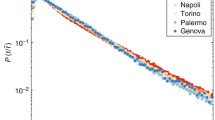Abstract
Markov Random Fields (MRFs) [5] are a class of probabalistic models that have been applied for many years to the analysis of visual patterns or textures. In this paper, our objective is to establish MRFs as an interesting approach to modelling genetic algorithms. Our approach bears strong similarities to recent work on the Bayesian Optimisation Algorithm [9], but there are also some significant differences. We establish a theoretical result that every genetic algorithm problem can be characterised in terms of a MRF model. This allows us to construct an explicit probabilistic model of the GA fitness function. The model can be used to generate chromosomes, and derive a MRF fitness measure for the population. We then use a specific MRF model to analyse two Royal Road problems, relating our analysis to that of Mitchell et al. [7].
Access this chapter
Tax calculation will be finalised at checkout
Purchases are for personal use only
Preview
Unable to display preview. Download preview PDF.
Similar content being viewed by others
References
J. Besag. Spatial interaction and the statistical analysis of lattice systems (with discussions). Journal of the Royal Statistical Society, 36:192–236, 1974.
D. F. Brown, A. B. Garmendia-Doval, and J. A. W. McCall. A genetic algorithm framework using Haskell. In Proceedings of the 2nd Asia-Pacific Conference on Genetic Algorithms. Global Link Publishing, May 2000.
D. F. Brown, A. B. Garmendia-Doval, and J. A. W. McCall. A functional framework for the implementation of genetic algorithms: comparing Haskell and Standard ML. In S. Gilmore, editor, Trends in Functional Programming, volume 2, pages 27–37, Portland, Oregon, 2001. Intellect Books.
H. Derin and P. A. Kelly. Discrete-index Markov-type random fields. Proceedings of the IEEE, 77:1485–1510, 1989.
S. Z. Li. Markov Random Field Modelling in Computer Vision. Springer, 1995.
N. Metropolis. Equations of state calculations by fast computational machine. Journal of Chemical Physics, 21:1087–1091, 1953.
M. Mitchell, J. H. Holland, and S. Forrest. When will a genetic algorithm outperform hillclimbing? In J. D. Cowan, G. Tesauro, and J. Alspector, editors, Advances in Neural Information Processing Systems 6. Morgan Kaufmann, 1994.
M. Pelikan and D. E. Goldberg. Research on the Bayesian Optimization Algorithm. Technical Report 2000010, Illinois Genetic Algorithms Lab, UIUC, Urbana, IL, 2000.
M. Pelikan, D. E. Goldberg, and E. Cant’u-Paz. BOA: The Bayesian Optimization Algorithm. In W. Banzhaf et al., editor, Proceedings of the Genetic and Evolutionary Computation Conference GECCO-99, volume I, pages 525–532, San Fransisco, CA, 1999. Morgan Kaufmann Publishers.
M. Pelikan, D. E. Goldberg, and F. Lobo. A survey of optimization by building and using probabilistic models. Technical Report 99018, Illinois Genetic Algorithms Lab, UIUC, Urbana, IL, 1999.
Author information
Authors and Affiliations
Editor information
Editors and Affiliations
Rights and permissions
Copyright information
© 2002 Springer-Verlag Berlin Heidelberg
About this paper
Cite this paper
Brown, D., Garmendia-Doval, A., McCall, J. (2002). Markov Random Field Modelling of Royal Road Genetic Algorithms. In: Collet, P., Fonlupt, C., Hao, JK., Lutton, E., Schoenauer, M. (eds) Artificial Evolution. EA 2001. Lecture Notes in Computer Science, vol 2310. Springer, Berlin, Heidelberg. https://doi.org/10.1007/3-540-46033-0_6
Download citation
DOI: https://doi.org/10.1007/3-540-46033-0_6
Published:
Publisher Name: Springer, Berlin, Heidelberg
Print ISBN: 978-3-540-43544-0
Online ISBN: 978-3-540-46033-6
eBook Packages: Springer Book Archive




